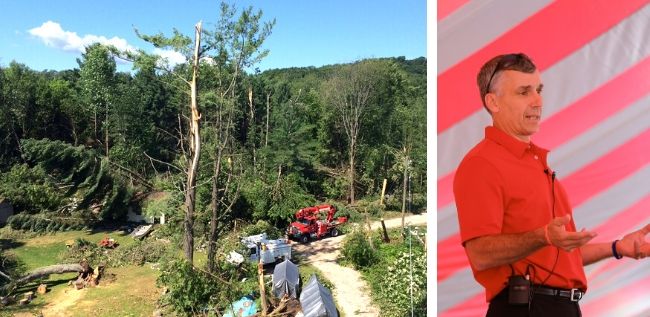The following was printed in the Traverse City Record Eagle, as well as distributed via other news outlets.
Here in Michigan, we’re known for having some pretty tough winters. Michigan’s electric cooperatives take a tremendous amount of pride in keeping the lights on in strenuous conditions. But, we’re also always prepared for a storm.
Natural disasters such as tornadoes, ice storms, hurricanes, or wildfires can hit at any time. Recovery efforts following such events are often long, grueling and extremely expensive. Power restoration is one of the highest priorities.
Electric cooperatives frequently receive federal or state grants to assist with storm recovery efforts following severe weather. But due to an unintended consequence of federal tax law changes in 2017, electric co-ops may be penalized for accepting that aid.
Most of the more than 900 electric co-ops nationwide are recognized as tax-exempt organizations by the IRS so long as they receive no more than 15 percent of their income from non-members.
Under the 2017 tax law changes, federal, state and local grants now count towards that 15-percent threshold. If that limit is exceeded, a co-op will lose its tax-exempt status.
This is an existential issue for hundreds of electric co-ops across the nation. No co-op should be forced to choose between accepting aid to rebuild a community after a disaster and losing its tax-exempt status.
Congress inadvertently created this problem. Now Congress needs to pass legislation to fix it – before it’s too late. A legislative fix is the only option and without it, electric coops and the millions of American families and businesses they serve may lose the ability to quickly recover after natural disasters.
Electric co-ops are private, not-for-profit companies created to supply electricity to their member-consumers. They belong to the communities they serve and operate at cost. Clearly, these co-ops should not receive a tax bill that could be in the millions of dollars for stepping up after a natural disaster.
It defies logic for one government agency to give with the right hand only to have the IRS take back with the left. Even those rural areas and co-ops not affected by natural disasters are vulnerable under the new tax law, because any kind of federal, state or local grant (broadband, economic development, etc.) has the potential to push co-ops over the 15-percent threshold.
Thankfully, there is a common-sense remedy on the table. The bipartisan RURAL Act (H.R. 2147 and S. 1032), introduced by Reps. Sewell (D-Ala.) and Smith (R-Neb.) and Sens. Portman (R-Ohio) and Smith (D-Minn.), will restore certainty and common sense. The bill ensures that co-ops do not jeopardize their tax-exempt status when they accept government grants.
Time is running out and lawmakers must pass legislation this year. While many of Michigan’s congressional delegation in both the House and Senate have co-sponsored the bill, we need them to take the vital next step and push the bill to a vote. Passage of the RURAL Act in 2019 is essential for America’s rural communities. Ask your legislators to take action on this bill. As co-ops prepare for the next natural disaster, relief can’t come soon enough.



I generally agree with the principle. Are for profit electric companies charged tax on any federal state government grants they receive?
It is a form of income so I can see the reasoning behind this legislation.
Thanks for considering.
As far as I know, investor owned utilities do not have access to these federal funds.
I hope this gets changed
Has anyone at CEC let Congressman Bergman know about this situation? In his short tenure as our US Representative he has attacked several issues that affect us. Seems that as a cooperative, CEC can approach him on behalf of our members.
Yes, we have had direct contact with Rep Bergman. He has signed on in support in the House. We now need the added push that it will take to get this on the floor for a vote. So far, no congressman has been able to get that done.
Our problem is with Nancy Pelosi. She doesn’t care about the American citizenry, she only cares about herself. It is a shame her inaction is going to hurt, not help, the American public she claims to be all about. Remember who gave you the screw when you vote next year.
What does Nancy Pelosi have to do with this? Facts only answer please. Your opinion of not liking her doesn’t really matter. The tax law changes that caused this were done by Trump and the Republicans. Nancy Pelosi did not vote for it.
It would be helpful to have a specific call to action immediately in posts such as this. I understand this issue and so I skimmed to the bottom to see about pending legislation. Should we all contact our respective Reps and Senators and urge the passage, who they might be, what wording should we use- this would be helpful. If you’re looking for advocacy, make it simple for your customers to become advocates and lobby. Both the bills have been introduced and referred to committees (H- Ways and Means, S- Finance), they read identically, so it seems to me maximum pressure should be placed on committee Chairs to get the bills voted out of committee so they can be placed on the legislative calendars. A faster solution is likely to attach them to another bill as a rider. Regardless, it’s hard to envision them getting out of committee and on the calendar before year end.
You are correct. I should have included the following link:
https://action.coop/composeletters/1399/
If the link doesn’t work from this medium, you can go to http://www.action.coop.
This is a quick and easy way to get the message to each individual’s respective legislator and does include language that you can use or alter to your liking.